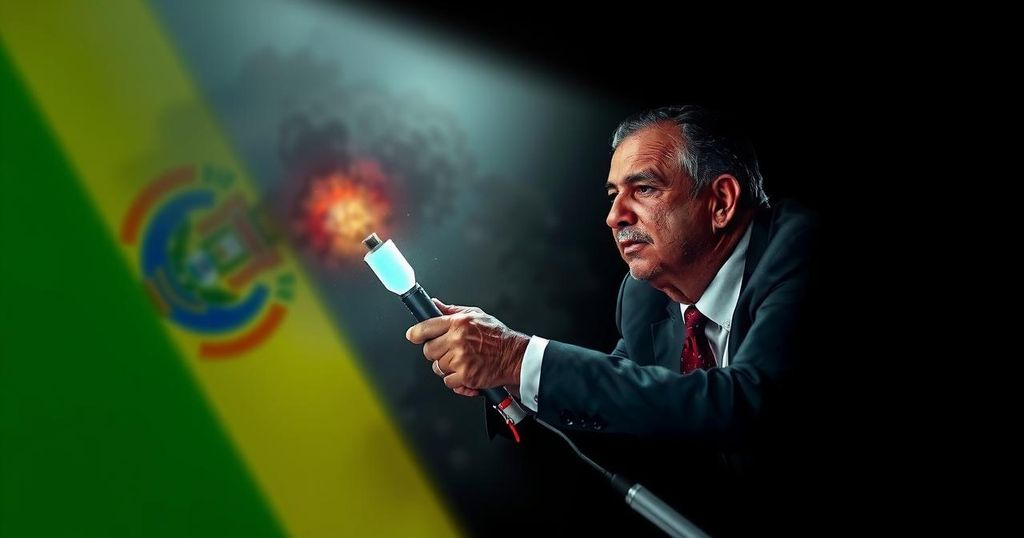Former Bolivian President Evo Morales claims that shots were fired at his vehicle during an assassination attempt amid rising political tensions in the ruling party. This incident reflects a power struggle with current President Luis Arce, following road blockades led by Morales’ supporters, contributing to unrest in an economically strained Bolivia. Meanwhile, Morales faces serious legal allegations as he navigates these challenges ahead of the 2025 elections.
Evo Morales, the former president of Bolivia, has reported that gunfire was directed at his vehicle on Sunday, amidst escalating political tensions within the ruling socialist factions. Morales, who served as Bolivia’s first Indigenous president from 2006 until 2019, claims that this incident was a deliberate assassination attempt amidst a power struggle with the current president, Luis Arce, who previously served as his economy minister. In a radio interview, Morales recounted the event, stating that two vehicles blocked his path and opened fire, with one bullet narrowly missing his head. “I don’t know if they were soldiers or police,” he confessed. He further asserted, “This was planned. The idea was to kill Evo.” A video shared by Morales on Facebook documented the harrowing event, showcasing at least two bullet holes in the vehicle’s windshield, while his driver, sustaining injuries, continued to operate the car. Roberto Rios, the Deputy Security Minister, announced that an investigation into the alleged attack would ensue, while emphasizing that law enforcement had not engaged in any operations against Morales. Rios affirmed the commitment of state security authorities to investigate all reports, regardless of their validity. This incident coincides with intensifying conflicts, as Morales’ supporters have been blocking roads across central Bolivia. Security forces have been attempting to dismantle these blockades, generating fears of further unrest in a nation that is already enduring economic hardships. The current government has accused Morales of attempting to destabilize the country through these blockades, which have severely impacted food and fuel supply nationwide, and noted that 14 police officers suffered injuries while enforcing the law against protestors. Amidst this turmoil, Morales faces serious allegations of inappropriate conduct involving minors. Despite these charges, which he vehemently denies, and the subsequent issuance of an arrest warrant, he maintains that these developments are politically motivated and part of a campaign of judicial harassment orchestrated by the current government. As the political landscape intensifies, both Morales and Arce, who share alignment with the Movement Toward Socialism (MAS) party, find themselves at odds over matters of policy and leadership direction, directly impacting the forthcoming 2025 elections.
Evo Morales has been a significant figure in Bolivian politics, being the first Indigenous president and serving two terms. His tenure was marked by economic improvements but also controversies. After resigning in 2019 amid allegations of electoral fraud, Morales has remained a potent force in the political arena, often opposing the current ruling party led by his former ally, Luis Arce. The ongoing tensions within the Movement Toward Socialism (MAS) party reflect broader struggles related to power, governance, and accusations of destabilization in Bolivia, compounded by economic challenges such as dwindling gas production and high inflation. Morales’ legal troubles add another layer of complexity to an already tension-filled atmosphere as Bolivia approaches its next electoral cycle.
The reported assassination attempt on Evo Morales highlights the precarious state of political affairs in Bolivia, characterized by factional infighting within the ruling socialist party. As tensions mount ahead of the 2025 elections, the possibility of increased unrest looms, particularly in light of Morales’ contentious relationship with current President Luis Arce. The alleged attack, coupled with ongoing socio-economic challenges and Morales’ legal predicaments, further complicates the nation’s political landscape, foreshadowing a turbulent period ahead.
Original Source: www.aljazeera.com






